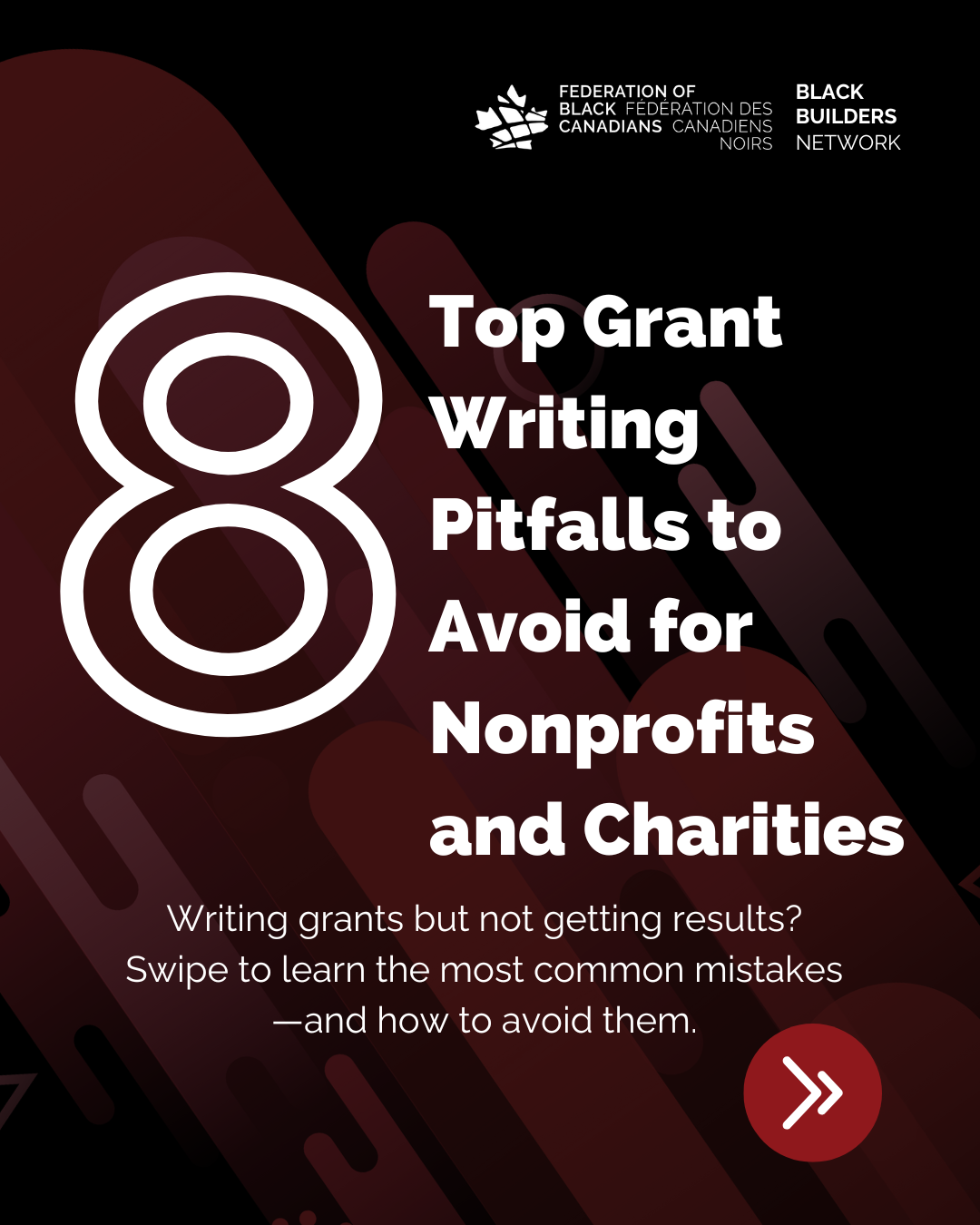When it comes to grants, it’s tempting to believe that more applications mean better chances of success. But applying for every opportunity, especially those that don’t truly align with your mission can drain your time, damage your credibility, and weaken your overall funding strategy. Especially for Black non profits and charities, which are generally newer organizations with limited resources spending countless hours on the wrong grants can put your objectives weeks and months behind. Not every grant is worth pursuing and knowing which ones to avoid is just as important as knowing where to focus.
Places and Situations Where You Should Stop Applying for Grants
1. Grants That Don’t Align with Your Mission or Project Goals
A common and expensive mistake is applying for grants that don’t match the work your organization actually does. Even a well-written proposal is unlikely to succeed if it doesn’t fit the funder’s goals. If you find yourself forcing your project to match their priorities, it’s probably not the right grant to pursue. (M.J. Murdock Charitable Trust, 2022). Funders look for strong alignment between their priorities and your outcomes. If you have to stretch your narrative too far to fit, it’s a sign you should move on.
What to Do Instead: Apply only to grants that directly support the work your organization already does, without needing to stretch or change your core purpose. It’s important to clearly define your organization’s mandate so you can quickly recognize how it aligns with a funder’s eligibility criteria. Once that connection is clear, plan how to highlight it effectively throughout your application.
Why It’s Important: Funders are more likely to support organizations whose goals and values clearly align with their own and misaligned proposals are quickly rejected.
2. Grants You Are Not Eligible For
Not paying close attention to eligibility rules is a common and costly mistake. If you miss important details like where your organization is located, what type of group you are, or what kind of work the grant supports you could be disqualified right away(Grant Engine, 2022).
What to Do Instead: Before you start writing, carefully read every eligibility detail (location, organization type, project focus) and only apply if you meet all of them. Finally, make sure you have the required documents in order and that they are easily accessible.
Why It’s Important: Applying for grants you’re not eligible for wastes time, lowers morale, and can damage your credibility with funders.
3. Ignoring Specific Application Guidelines
It might not seem important at first, but skipping over small details like formatting, page limits, or how to name your files can get your application rejected. In grant writing, precision matters, it is a competitive market for grants. Any deviation from specific guidelines gives funders an easy way to cut down the number of applications they need to sort through. Always read and follow every application instruction exactly as written.
In 2023-2024, OTF received over 13,162 applications and funded about 3299, implying a ~25% success rate (OTF Annual Report, 2024).
What to Do Instead: Print or highlight the grant instructions and check off each detail like word count, document format, and deadlines as you prepare your application. FBC uses Asana, a project management tool, to keep track of important details.
Why It’s Important: Funders often reject applications outright for not following instructions, no matter how good the content is.
4. Assuming Relationships Guarantee Funding
While building connections with funders is important, relying on personal relationships alone is risky. It is important to note that funding decisions are made based on proposal merit and mission alignment, not personal familiarity (American Psychological Association, 2022). A strong application must stand on its own, regardless of who you know. Although there is no guarantee that the connection you have will review your application. It is still recommended to see if you can have a conversation with the funder beforehand so you can get feedback on the feasibility of your proposal.
What to Do Instead: Treat every application like you’re introducing your work for the first time, clearly explaining your impact, goals, and alignment.
Why It’s Important: Most funders base decisions on the quality and fit of the proposal, not familiarity so strong documentation is key.
5. Generic “One-Size-Fits-All” Applications
Tailoring, editing and refining are essential. It is essential to customize your grant and not rely on a single grant format. Remember that each funder has unique priorities, values, and review criteria. While having templates and a strong process to streamline the start of a grant writing project is a great idea.A recycled proposal is almost always not suitable for funders.
What to Do Instead: Rewrite and tailor each application to reflect the funder’s specific language, priorities, and goals in both your narrative and budget.
Why It’s Important: Funders look for signs that you’ve done your research and understand their mission; a generic proposal often signals the opposite.
6. Applying for Grants in Crisis Mode
If you are looking to obtain money quickly, grants are not your solution. It is important to note that the grant application process can take months to complete and there is no guarantee of receiving said grant. If your goal is to make money quickly then you are encouraged to look for faster fundraising strategies instead. Keep in mind that even if you receive a grant, the funds often come with strict rules on how and when the money can be spent and many require you to pay upfront and get reimbursed later. That’s why it’s important to build a strong fundraising strategy with diverse income sources to keep your organization financially stable.
What to Do Instead: Focus on faster alternatives like online fundraising, donor appeals, or sponsorships while developing a long-term grant plan.
Why It’s Important: The grant process is lengthy and competitive, urgent funding needs are better served by more flexible strategies.
7. New Organizations Seeking Immediate Grants
Newly established nonprofits face an uphill battle with grants. Funders generally prefer organizations with a proven track record. As noted in Pathways to Growth, focusing first on building credibility, demonstrating impact, and securing diverse revenue streams will make grant-seeking efforts more successful down the line (Pathways to Growth, 2022).
What to Do Instead: Spend your first year building credibility with small-scale programs, strong reporting, and diversified funding before seeking major grants.
Why It’s Important: Funders prefer organizations that show stability, community trust, and measurable impact, not just a good idea. Some funders specifically require organizations to demonstrate proven impact or have clear systems in place to measure their results.
8. Sketchy Grant Sources
Not every source advertising “free grants” is legitimate. Avoid:
- Guaranteed grant services: no one can guarantee grant success.
- Applying for grants without reviewing eligibility carefully: credibility matters.
What to Do Instead: Use only reputable sources (like government sites, trusted foundations, or known grant directories) and avoid any offer that sounds too good to be true or requires payment.
Why It’s Important: Falling for scams or low-quality sources can waste money, compromise data, and harm your organization’s reputation.
Test Your Knowledge: Should You Apply?
Which of the following is the most strategic and fundable reason to apply for a grant opportunity?
- You have a strong personal relationship with someone at the foundation, even though your project doesn’t match their typical funding areas.
Your organization meets all eligibility criteria, and your project directly supports the funder’s mission and current funding priorities.
Your organization is new and needs immediate funding to build out programming and cover startup costs.
The grant amount is large, and although your program isn’t a perfect match, you believe you could adjust your narrative to make it work.
Correct Answer: B
Are you a Black-led, Black-serving, or Black-owned nonprofit, charity, or organization looking to secure more funding and create lasting impact in your community?
Join the Black Builders Network— a national support network powered by the Federation of Black Canadians. Whether you’re just getting started or scaling your initiatives, Black Builders connects you with:
- Expert guidance on grant writing and nonprofit operations
- Access to funding opportunities and workshops
- 1-on-1 coaching and mentorship
- A growing community of changemakers just like you
- Promotional support to amplify your mission
Our team of experienced professionals provides the insights and tools you need to strengthen your organization and drive real change.
? Join Black Builders today and take the next step in building a stronger, more resilient future for your community.
References
American Psychological Association. (2022). The risks of relying solely on relationships for grant success. Retrieved from www.apa.org
Bauer, D. G. (2011). The “How To” Grants Manual: Successful Grantseeking Techniques for Obtaining Public and Private Grants (6th ed.). Rowman & Littlefield Publishers.
Get Fully Funded. (2023). Why grants aren’t the best solution for urgent nonprofit needs. Retrieved from www.getfullyfunded.com
Grant Engine. (2022). Common grant mistakes: Neglecting eligibility criteria. Retrieved from www.grantengine.com
Investopedia. (2023). Top mistakes to avoid in grant applications. Retrieved from www.investopedia.com
M.J. Murdock Charitable Trust. (2022). Aligning mission with grant opportunities. Retrieved from www.murdocktrust.org
Munezero, M. (2023). 10 Common Mistakes to Avoid in Grant Applications for Beginners. Medium.
Ontario Trillium Foundation. (2024). 2023–2024 annual report. https://otf.ca/sites/default/files/OTF-AnnualReport_2023-24_EN-v2.pdf
Pathways to Growth. (2022). Why brand new nonprofits struggle to win grants. Retrieved from www.pathwaystogrowth.com
USFCR Blog. (2022). How eligibility mistakes can ruin your grant application. Retrieved from www.usfcr.com




